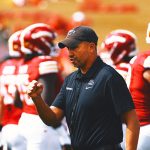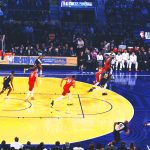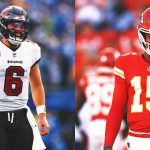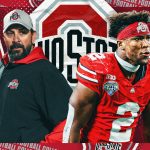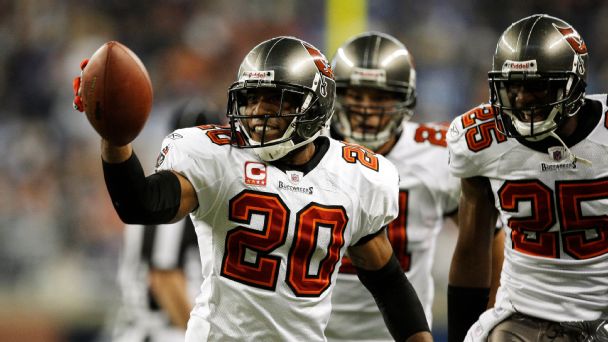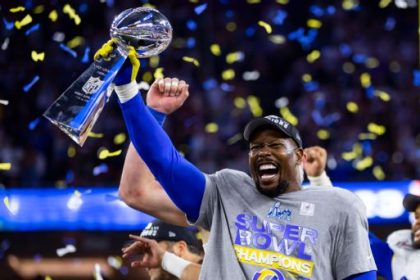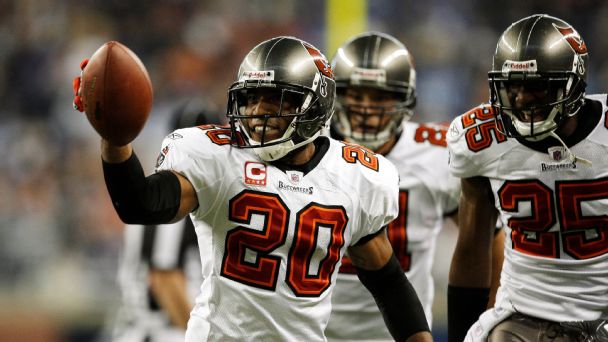
Cornerbacks Ronde Barber and Darrelle Revis, outside linebacker DeMarcus Ware and linebacker Zach Thomas were named to the Pro Football Hall of Fame class of 2023 as modern-era candidates along with tackle Joe Thomas, a 10-time Pro Bowl selection with the Cleveland Browns. It is the second time, other than the Hall’s 15-member centennial class, four modern-era defensive players have been in the same enshrinement class.
Coach Don Coryell, defensive end/tackle Joe Klecko, linebacker Chuck Howley and cornerback Ken Riley will also be enshrined. Coryell will get in as a coach/contributor while Klecko, Howley and Riley were seniors committee finalists.
Revis and Thomas were in their first year of eligibility. This year’s class was chosen by the Hall’s Board of Selectors in a virtual meeting in January. The nine Hall of Famers will be enshrined in early August in Canton, Ohio.
Here is a closer look at the class of 2023.

Ronde Barber, cornerback
Tampa Bay Buccaneers, 1997-2012
Barber was a testament to durability and versatility in his career. After he played in his first regular-season game, Barber didn’t miss another one over the next 15 years. He was an elite cover corner, especially as a nickelback, could rush the passer with impact and tackle with purpose in the run game.
Why he was elected: His résumé is stuffed with production, including 47 career interceptions, an astounding 88 tackles for loss, 28 sacks and five 90-tackle seasons. A five-time Pro Bowl selection, three-time first-team All-Pro and an All-Decade selection for the 2000s, Barber became the prototype of what defenses needed as a nickel corner in increasingly pass-happy times.
Signature moment: For a guy who has over 60 game balls from his storied career, it would be difficult to beat a 92-yard pick-six to seal a Super Bowl trip. Barber made the play with 3:12 left in the Buccaneers’ win over the Philadelphia Eagles in the NFC Championship Game to help send Tampa Bay to Super Bowl XXXVII. Barber pointed at the name on the back of his jersey as he roared into the end zone.
Quotable: “He changed the way defenses played, he changed the way we think about the nickel position and his versatility and intelligence to do whatever we needed him to do.” — Hall of Fame coach Tony Dungy
Don Coryell, head coach
St. Louis Cardinals, 1973-1977; San Diego Chargers, 1978-1986
Coryell’s coaching tree includes Hall of Famer Joe Gibbs — Coryell’s offensive coordinator for two seasons in San Diego and running backs coach with the Cardinals — and the former Army paratrooper’s impact on the passing game can be seen throughout the league today.
Why he was elected: From his three-digit numbering system for pass routes to unleashing running tight ends on what were previously considered wide receiver routes, the “Air Coryell” offense led the league in passing in seven of his eight seasons in San Diego.
Signature moment: Coryell never coached in a Super Bowl, but his legacy endures week after week thanks to him pushing the envelope in how offense was played and what defenses had to do to react. Hall of Famer Dan Fouts, who played for Coryell for nine seasons, has said as he watched Super Bowl XXVII — Dallas‘ 52-17 win over the Buffalo Bills when quarterback Troy Aikman threw four touchdown passes — he could recite the playcalls because Norv Turner was using a version of Coryell’s offense with the Cowboys.
Quotable: “He is the Godfather of the modern passing game.” — former St. Louis Rams coach Mike Martz
Chuck Howley, linebacker
Chicago Bears, 1958-1959; Dallas Cowboys, 1961-1973
Howley was named to the Pro Bowl multiple times as both a strongside and weakside linebacker during his career and was a five-time first-team All-Pro selection. He suffered a knee injury in his second season with the Bears that was so severe he played in three games in 1959 and sat out the entire 1960 season. But after a trade in 1961 to the Cowboys, he played in 165 games as a fixture on defense.
Why he was elected: Howley routinely excelled no matter where he was in the Cowboys’ defense. He had a career-best six interceptions as a strongside player in 1968 and then five interceptions in 1971 as primarily a weakside player. He had at least two interceptions in seven of his seasons, 26 sacks before they were an official statistic and was at his best in the biggest moments. His 18 fumble recoveries and 25 interceptions — 43 takeaways in all — are among the most of any linebacker in league history.
Signature moment: In Super Bowl V, Howley intercepted two passes — one from Johnny Unitas and one from Earl Morrall — and is still the only player from the losing team to be named Super Bowl MVP. And in Super Bowl VI, he had an interception and a fumble recovery in a Cowboys win over the Miami Dolphins.
Quotable: “I don’t know that I’ve ever seen anybody better at linebacker than Chuck Howley.” — Hall of Fame coach Tom Landry
Joe Klecko, defensive end/tackle
New York Jets, 1977-1987; Indianapolis Colts, 1988
Klecko was voted to the Pro Bowl at three different positions in his career — defensive end, defensive tackle and nose tackle. He finished second to Lawrence Taylor in the league’s Defensive Player of the Year voting in 1981.
Why he was elected: The versatility to play with enough quickness to flourish at defensive end to go with enough toughness, power and balance to flourish on the interior is rare. And Klecko was unselfish enough to, two years after a 20.5-sack season at end, move to defensive tackle for the Jets.
Signature moment: Klecko’s 20.5 sacks came in 1981 — the year before sacks became an official statistic — so it doesn’t appear in the official’ lists of best seasons since, but it is believed to be one of the 15 best seasons in league history.
Quotable: “He went to the Pro Bowl at three different positions. Strong, quick, tough. He was great no matter where he lined up.” — Hall of Famer Joe DeLamielleure
Darrelle Revis, cornerback
New York Jets, 2007-2012, 2015-2016; Tampa Bay Buccaneers, 2013; New England Patriots, 2014; Kansas City Chiefs, 2017
A seven-time Pro Bowl selection, four-time first-team All-Pro who launched a bevy of shirts and signs touting the difficulty of completing a pass on “Revis Island.”
Why he was elected: He was at his best in man coverage and routinely lined up across from the league’s best receivers throughout his career, no matter where they lined up in the formation. Rarely tested — former Patriots and Bucs quarterback Tom Brady has said he simply avoided Revis whenever possible — he finished his career with 25 interceptions and 139 passes defensed.
Signature moment: For singular moments, it would be difficult to omit an interception over Randy Moss in 2009 or the one-hander against the Dolphins in 2008 or the last interception return for a touchdown of his career — 100 yards — in 2011. Though he has publicly said he didn’t enjoy his time in New England, Revis earned his Super Bowl ring with the Patriots in 2014 with a three-game postseason run that included an interception in the AFC Championship Game.
Quotable: “He can really do it all … he’s really long, he’s really strong, he’s patient … he never guesses wrong, he’s smart, sees the whole field. I’ve never played against anyone who’s as good as him.” — Brady
Ken Riley, cornerback
Cincinnati Bengals, 1969-1983
Riley should be on the cover of the brochure that explains why players and coaches should take more time in Pro Bowl voting. He is tied for fifth all time with 65 interceptions, played 202 games over his 15-year career yet was never named to the Pro Bowl. That included his final season — 1983 — when he was selected a first-team All-Pro. There were no designations for returners then so his teammate — Lemar Parrish — was selected for six Pro Bowls, including one season when Parrish did not have an interception, because he was one of the league’s best returners.
Why he was elected: A seniors committee finalist, Riley, who died in 2020 at age 72, was the only top-seven player in interceptions not in the Hall of Fame. Among players who played cornerback for their entire careers, only Dick “Night Train” Lane finished with more career interceptions. A former quarterback at Florida A&M, Riley played with a full understanding of offenses and his skills allowed him to make life difficult for the league’s best receivers.
Signature moment: He had plenty, including three interceptions in seven career playoff games. But at the end of the 1979 season, his 11th, Riley considered retirement — the Bengals finished 4-12 for the second consecutive year — but Forrest Gregg was hired as the team’s new coach. Gregg convinced Riley to stay and two seasons later, Riley played in his only Super Bowl. Riley had 21 interceptions in his final four seasons, including eight, at age 36, in last season.
Quotable: “Lemar [Parrish] and I were like Willie Mays and Hank Aaron. Willie Mays was the flashy one, that was Lemar. But I was the one getting all the interceptions.” — Riley in 2015
Joe Thomas, tackle
Cleveland Browns, 2007-2017
The 10-time Pro Bowl selection and member of the 2010s all-decade team, Thomas was in his first year of Hall of Fame eligibility and is the first post-expansion Browns player to be enshrined after the team’s return in 1999. He didn’t miss a snap, let alone a game, until the final year of his career — Thomas played 10,363 consecutive snaps until he tore his left triceps seven games into his last season.
Why he was elected: Thomas never played in a postseason game and the Browns’ only winning season in his career came in his rookie year when Cleveland finished 10-6. In his final year, the team went winless. He played for seven different head coaches and blocked for 18 different starting quarterbacks. Yet, day after day, game after game, season after season, Thomas played at an elite level. He was a Pro Bowl selection in 10 consecutive seasons, a first-team All-Pro in six.
Signature moment: On the surface, it was a rather unassuming 9-yard run by Isaiah Crowell on Sept. 17, 2017, in Baltimore’s M&T Bank Stadium. But it was also his 10,000 consecutive snap, as in every offensive snap of every game to that point in his career. An almost unheard of total for any player, especially an offensive lineman asked to block the league’s best pass-rushers for so long. It signified a career of excellence.
Quotable: “I have nothing but respect for the way he has carried himself and the amazing things he has accomplished. He has played the game at an extremely high level. Joe is a heck of a football player and an even better man.” — former Browns general manager John Dorsey
Zach Thomas, linebacker
Miami Dolphins, 1996-2007; Dallas Cowboys, 2008
Thomas, who former Colts and Broncos quarterback Peyton Manning has called one of the most difficult defensive players to face because of his preparation, was a seven-time Pro Bowl selection as well as a five-time first-team All-Pro. Thomas was selected to the 2000s all-decade team.
Why he was elected: Thomas took on the league’s measurables for a linebacker — height, weight, speed — like he did blockers, just things to get out of his way to go make plays. Deemed too short (5-11) and too slow, the Dolphins took him in the fifth round of the 1996 draft. They got 10 120-tackle seasons — he led the league twice — as Thomas routinely frustrated quarterbacks with his ability to know where the play was going and finish it off when he got there. He also played on the Dolphins’ special teams units throughout his career.
Signature moment: Thomas piled up tackles — setting the franchise record — had 17 interceptions (his four touchdown returns are also a franchise record), 20.5 sacks and 16 forced fumbles in his career. But his tenacity was on full display in the last postseason game he played — a 20-3 loss to the Ravens to close out the 2001 season when the Miami offense gained 151 yards — when Thomas finished with 22 tackles.
Quotable: “No one prepared harder. No one cared more.” — Hall of Famer Jason Taylor
DeMarcus Ware, outside linebacker
Dallas Cowboys, 2005-2015; Denver Broncos, 2014-2016
Ware was a nine-time Pro Bowl selection in his career, a four-time first-team All-Pro and was selected to the 2000s all-decade team. Ware was a skilled technician who relentlessly studied what opposing linemen did and had the ability to put those findings into action.
Why he was elected: He is ninth all time in sacks, with 138.5, since the league made it an official statistic in 1982. He had eight seasons with at least 10 sacks, including 20.0 and 19.5 in 2011. He led the league in sacks twice (2008 and 2010) and led the league in tackles for loss three times. Combine that with the fact Ware’s coaches repeatedly said he was a top-tier run defender, worried about far more than simply pursuing sacks, and you have a gold jacket combination.
Signature moment: It took Ware 11 seasons to advance to a Super Bowl, and when that opportunity was in his sights, he played some of his best football. In the Broncos’ win over the New England Patriots in the 2015 AFC Championship Game, Denver’s defense hit Tom Brady 20 times with four sacks. Ware was at his best with seven of those quarterback hits. And while Von Miller later won MVP honors in Super Bowl 50 with 2.5 sacks and two forced fumbles, Ware also had two sacks and four more quarterback hits in the title game. He finished that postseason with twice as many quarterback hits as Miller — 12 to six — in the Broncos’ three postseason games.
Quotable: “DeMarcus is one of the best I’ve ever coached or ever seen. I’ve said I wish I had his body, so does my wife.” — former Cowboys head coach and Broncos defensive coordinator Wade Phillips

